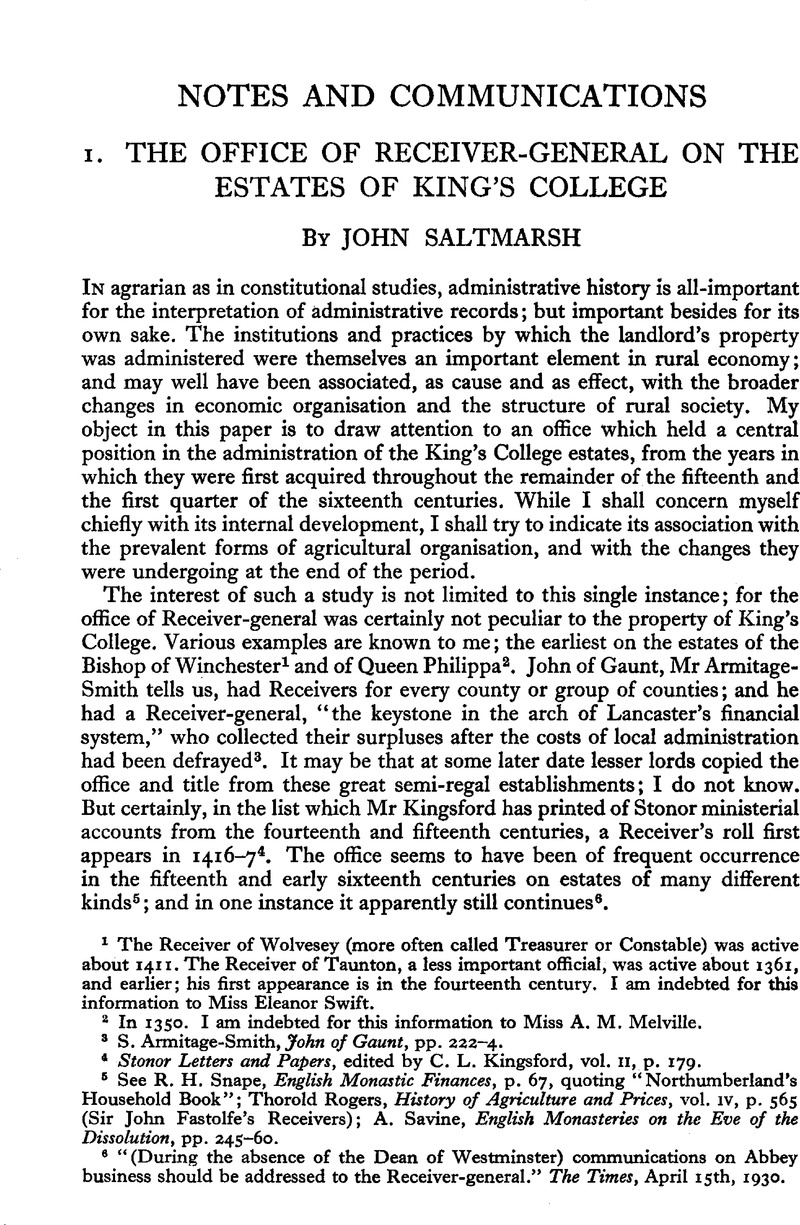No CrossRef data available.
Article contents
1. The Office of Receiver-General on the Estates of King's College
Published online by Cambridge University Press: 20 December 2011
Abstract

- Type
- Notes and Communications
- Information
- Copyright
- Copyright © Cambridge University Press 1930
References
1 The Receiver of Wolvesey (more often called Treasurer or Constable) was active about 1411. The Receiver of Taunton, a less important official, was active about 1361, and earlier; his first appearance is in the fourteenth century. I am indebted for this information to Miss Eleanor Swift.
2 In 1350. I am indebted for this information to Miss A. M. Melville.
3 S. Armitage-Smith, John of Gaunt, pp. 222–4.
4 Stonor Letters and Papers, edited by C. L. Kingsford, vol. 11, p. 179. 5 See 5.See R H. Snape, English Monastic Finances, p. 67, quoting “Northumberland's Household Book”; Thorold Rogers, History of Agriculture and Prices, vol. IV, p. 565 (Sir John Fastolfe's Receivers); A. Savine, English Monasteries on the Eve of the Dissolution, pp. 245–60.
6 “(During the absence of the Dean of Westminster) communications on Abbey business should be addressed to the Receiver-general.” The Times, April 15th, 1930.
7 Elsewhere in the account he is described as “tam Superuisoris Receptoris domini ibidem quam Gubernatoris & Ballivi Comput'.”
8 He is identified with Henry Somer, Chancellor of the Exchequer (for whom see Dictionary of National Biography, vol. LIII), by an eighteenth-century antiquarian. K.C. Collections, vol.I, note on “Grantchester Manor and Sheepwalk.”
9 It is interesting to see Somer leasing part of his own lands to farmers, while himself farming lands of Merton College and tithes of the Prior of St Neot's.
10 Compoti Receptoris Cantabrigie, Easter 25-Michaelmas 26 H. 6.
11 Compotus Alani Seymper Receptoris, 30–31 H. 6; here receipts from Cambridge are entered in detail.
12 “Copy in K.C. Ledger Book, vol. I, f. i.
13 From a valuation-roll, temp. H. 6.
14 At Grantchester for some years after 1452; the estate was apparently treated as a “home farm” at this time, and the Receivers had no share in its administration.
15 Though the actual payment was occasionally made in kind.
16 Commission and Indenture of Thomas Deken, K.C. Ledger Book, vol. I, f. xxiv. No earlier Receiver's commission than this is entered in the Ledger Book.
17 See, for an example of trouble that arose in some such manner as this, Sir William Sandes to Sir William Stonor (c. 1481), Stonor Letters and Papers, vol. II, p. 132.
18 Statute IX.
19 Statute LII (for the Circuit).
20 Statute XIV.
21 Statute LII, limiting the duration of the Audit.
22 Commission and Indenture of Thomas Deken, as above.
23 Registrum R. Wodelarke prepositi Cantabriggie, f. xi.
24 Or £10 to each Receiver when the office was divided, e.g. K.C. Mundum Book, 27 H. 6, sub titulo “Pensiones seruiencium collegij”; ibid. 33 H. 6, sub titulo “Soluciones pensionum ac stipendiorum.…”
25 Commission and Indenture as above.
26 K.C. Mundum Book, 27 H. 6, title as in note 2.
27 K.C. Mundum Book, 30 H. 6, sub titulo “Soluciones pensionum & stipendiorum” (showing that the change was not made before Michaelmas, 1451); Compotus Alani Seymper, 30–31 H. 6.
28 Compoti Bursariorum, 34–37 H. 6.
29 Commission and Indenture as above; Compotus Thome Deken Receptoris generalis, 37–38 H. 6.
30 Catalogue of Provosts, Fellows and Scholars, sub anno 1459. I quote from the folio MS in the College Muniment Room.
31 The usual fee was ten marks; see e.g. “Concessio facta M. Alexandra Lye,” K.C. Ledger Book, vol. I, f. xxxviij.
32 The latter duty is not, however, included in the terms of Alexander Lee's appointment.
33 R. H. Tawney, Agrarian Problem in the Sixteenth Century, p. 214.


